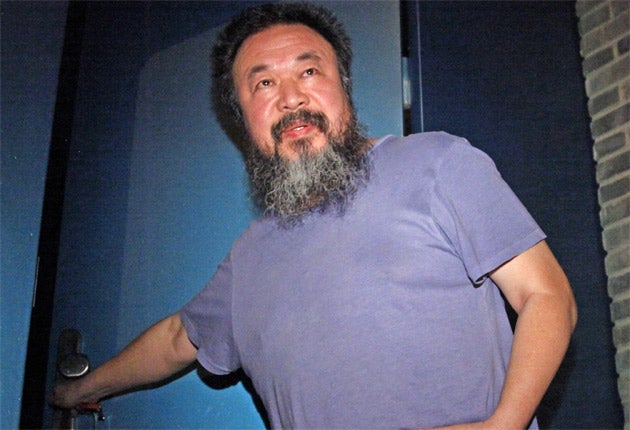How Ai Weiwei lost his voice
The dissident Chinese artist, recently released from jail, gives the impression of having had the fight knocked out of him

It was just eight months ago that the dissident Chinese artist, Ai Weiwei, told me that revolution was the only way to solve China's problems, and he felt change was in the air. Soon after that, he was taken away by security officials, emerging frail and subdued in June after three months of incarceration on alleged tax violations.
Now, in his first full interview since his release, Ai Weiwei is communicating again. But fans of the man who once called China's Communist Party a group of "gangsters" may have been surprised to read some of the sentiments expressed by the 54-year-old in his conversation with the Global Times – the only organ he has spoken to at length.
"Overthrowing the regime through a radical revolution is not the way to solve China's problems. The most important thing is a scientific and democratic political system," Mr Ai told the paper – which is the English-language offshoot of the Communist Party's main organ, the People's Daily.
While Mr Ai said the interview is real, it reads like it was scripted by the propaganda ministry, and has clearly been through the censorship process. The expression "scientific" is pure Communist Party.
"No one is above the law," the avant-garde artist, whose works have been displayed around the world, including at the Tate Modern, said in the interview.
The article is not completely toothless, but his remarks about human rights and democracy pale in comparison to his old fiery rhetoric.
"I will never avoid politics, none of us can. We live in a politicised society," he said. "You give up your rights when you dodge them. Of course you might live an easier life if you abandon some rights. But there are so many injustices, and limited educational resources. They all diminish happiness. I will never stop fighting injustice," he said in the interview.
The article also has a touch of House & Garden about it: "I'm having my studio and kitchen painted, and I've bought some new furniture to give the place a fresh look," he told the Global Times, which also noticed that he looked relaxed in a T-shirt that hung loosely on his more svelte frame. Mr Ai is also spending lots of time with his two-year-old son, the interviewer noted. A model of domesticity, he even has a new couch,
There is the air of intimidation hanging over his latest comments. Just a day earlier, he had been back on social-networking sites slamming the way his friends and fellow dissidents were being treated. Technically violating the terms of his bail – which stipulate that he must not use Twitter – Mr Ai urged his followers to support Wang Lihong and Ran Yunfei, two human rights activists locked up by the government.
On Monday, he also tweeted about the conditions of four associates who had been detained at the same time as him. "They innocently suffered immense mental devastation and physical torment," he wrote.
The comments were quite a leap from his first post-jail forays online, when he was penning enigmatic posts such as: "Lunch 10 dumplings, bodyweight regains 3kg."
Mr Ai was freed on bail on June 22, with the authorities saying he had confessed to evading what the Xinhua news agency called "a huge amount" of tax. State media reported that his company, the Beijing Fake Cultural Development Ltd, promised to pay back the overdue amount. He was also accused of intentionally destroyed accounting documents.
Many in the human rights community believe the charges were trumped up and that Mr Ai was taken out of circulation to remove a long-term thorn in the Communist Party's side.
In a brief telephone conversation with Mr Ai after his release, he gave me the impression of a man who has had the fight knocked out of him. In his heyday he was combative and energetic, but clearly something happened to him in custody that has frightened him. "There is a suggestion that the pressure is being put on the families," said Kerry Brown, a China expert and head of the Asia Programme at London's Chatham House think-tank. "He's speaking but he's not really speaking."
A source familiar with events surrounding Mr Ai's detention told Reuters in an interview published yesterday that the artist had endured intense psychological pressure during his time behind bars, and was interrogated more than 50 times by police who accused him of stirring dissent.
The source, who asked not to be named as he feared recriminations, said Mr Ai was held at two separate locations, adding that at one he was watched 24 hours a day and had to ask permission to drink water or use the toilet. "It was immense psychological pressure," the source said.
When Mr Ai was released, the source said, police told him he "could still be sentenced to 10 years" – perhaps a reason for Mr Ai's low-key presence since his release. He was also apparently told not to speak to journalists or human rights activists for a year after his release.
Nonetheless, Mr Ai has already accepted a teaching offer at the Berlin University of the Arts, although it remains to be seen if he is allowed to leave. And, shortly after Mr Ai's tweets expressing support Wang Lihong and Ran Yunfei, Mr Ran was freed. Ai Weiwei's voice may have been quietened. But, it seems, it still carries weight.
Subscribe to Independent Premium to bookmark this article
Want to bookmark your favourite articles and stories to read or reference later? Start your Independent Premium subscription today.

Join our commenting forum
Join thought-provoking conversations, follow other Independent readers and see their replies